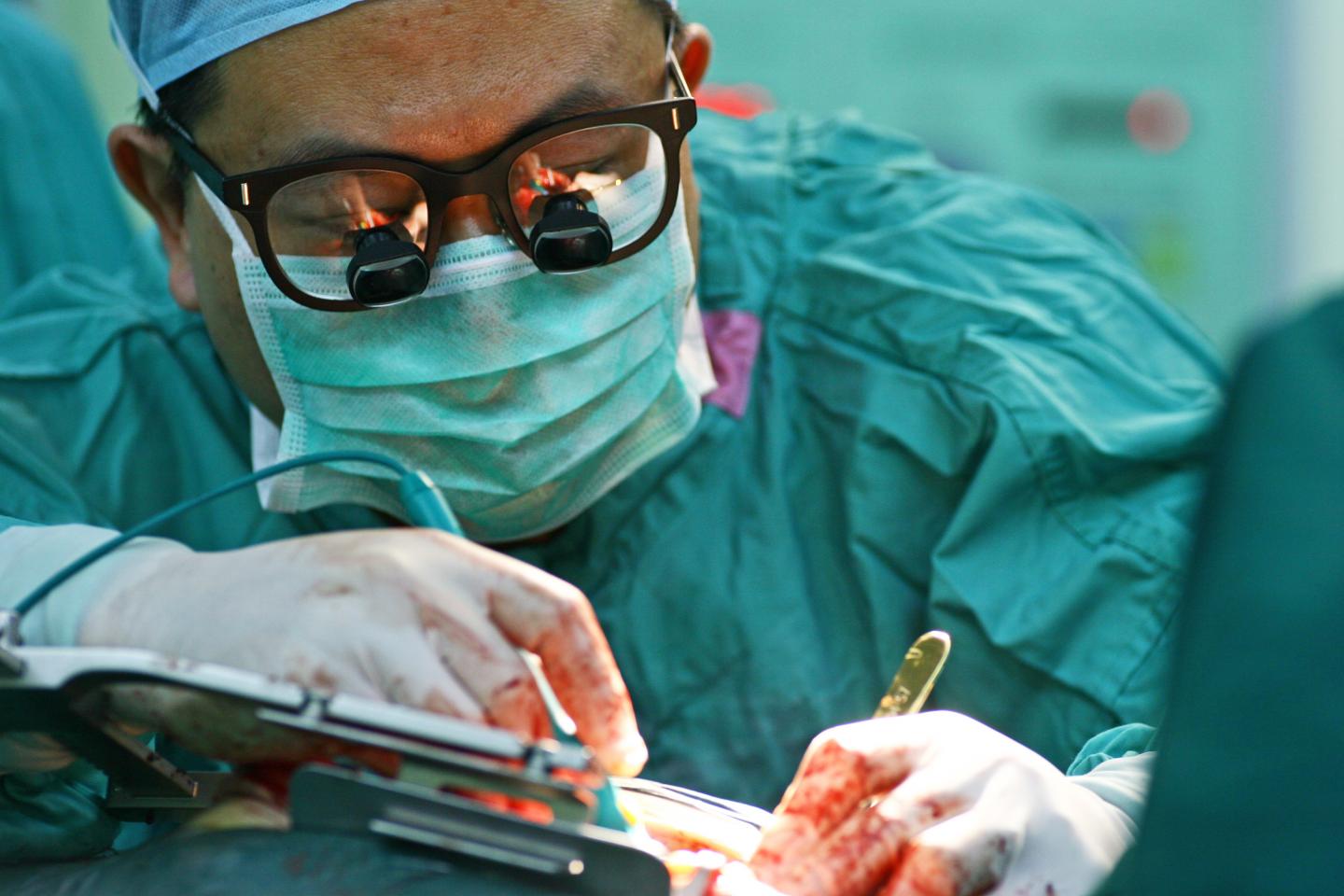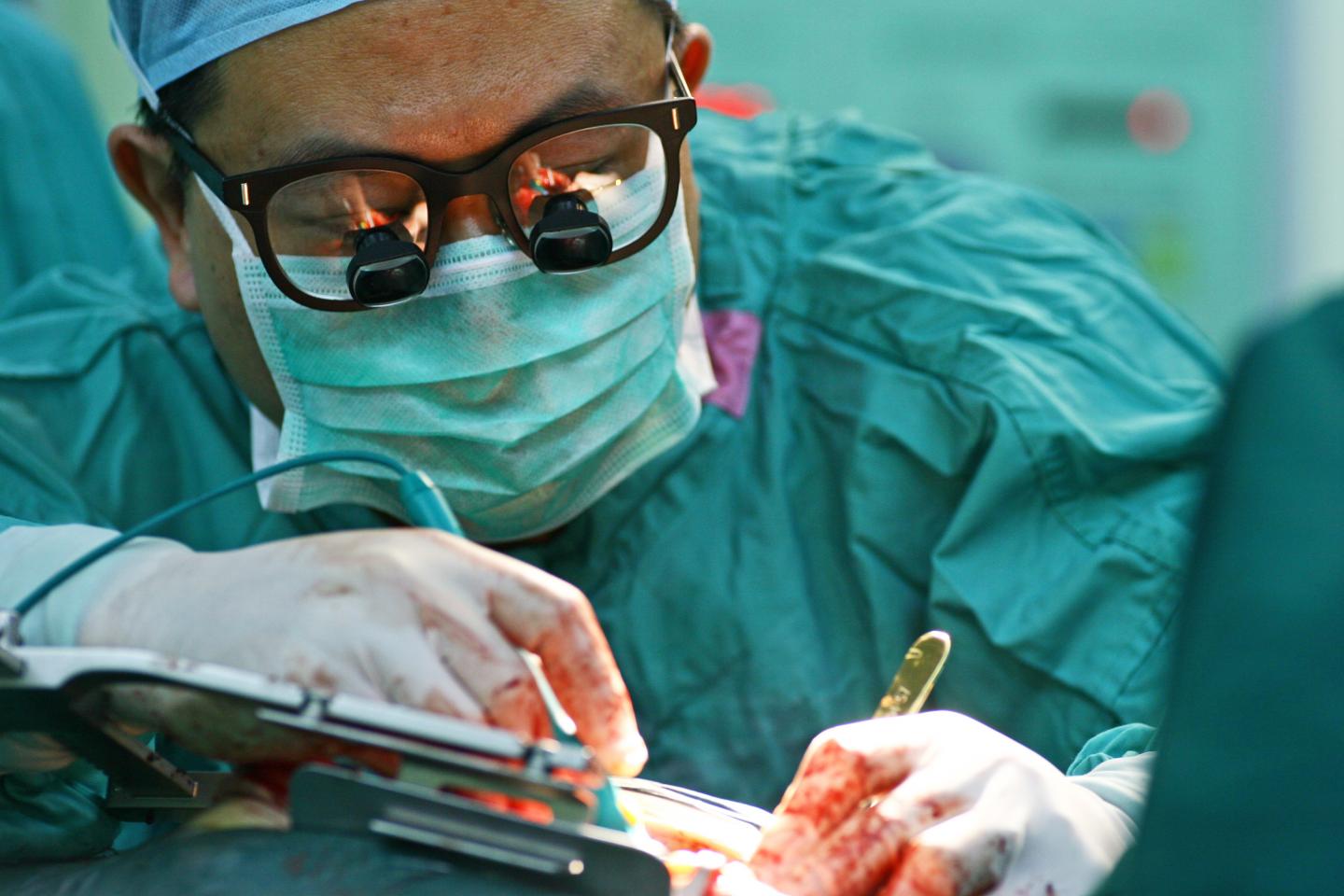
Credit: ATS
June 22, 2018– Administration of nitric oxide gas during and for 24 hours following heart surgery decreased the risk of patients developing acute and chronic kidney problems, a randomized, controlled trial conducted in China found.
The study, "Nitric Oxide Decreases Acute Kidney Injury and Stage 3 Chronic Kidney Disease after Cardiac Surgery," is published online in the American Thoracic Society's American Journal of Respiratory and Critical Care Medicine.
Researchers studied 244 adults in Xi'an, China, who underwent surgery to replace more than one heart valve. Because of the duration of the procedure, the patients required placement on cardiopulmonary bypass (a heart-lung machine) for at least 90 minutes.
"Previous studies showed that prolonged cardiopulmonary bypass causes disruption of circulating red blood cells and the release of hemoglobin, which can cause acute kidney injury, leading to kidney failure and the need for long-term hemodialysis," said lead study author Lorenzo Berra, MD, medical director of respiratory care at Massachusetts General Hospital in Boston and assistant professor at Harvard Medical School. "We tested whether administration of nitric oxide, a gas normally produced by cells in the lining of blood vessels, might render hemoglobin 'inert,' thereby decreasing the risk of both acute and chronic kidney injury."
The authors found that patients who received 80 parts per million of nitric oxide during and for 24 hours after surgery were less likely to develop acute kidney injury, with a decrease from 64 percent in the placebo-treated patients to 50 percent in those who received nitric oxide.
The risk of progressing to more serious kidney disease (Stage 3 Chronic Kidney Disease) was also reduced at 90 days, with a decrease from 33 percent in the placebo-treated patients to 21 percent in those who received nitric oxide. After one year, 31 percent in the placebo group had serious kidney disease compared to 18 percent in the nitric oxide group.
There was also a decrease in the overall mortality rate after one year, from 6 percent in the placebo group to 3 percent in the nitric oxide group. This decrease did not reach statistical significance, possibly because of the relatively small number of patients included in the study, the researchers wrote.
According to the authors, several drugs have been tested and shown to be ineffective at protecting the kidneys after cardiac surgery. This is the first study to show that a pharmacological treatment can reduce acute and chronic kidney injury resulting from cardiac surgery.
Importantly, the authors noted that administration of nitric oxide gas appears to be safe: nitric oxide delivery did not have to be reduced or stopped in any of the patients who received the gas.
The authors caution that study results may not be generalizable to all cardiopulmonary bypass patients. In the Chinese study, all patients underwent the same type of surgery, and most of the patients were young (average age: 48) because their heart valve problems were caused by rheumatic fever. In North America and Europe, degenerative heart disease is a more common cause of valve dysfunction, and these older patients are more likely to have additional medical problems.
The researchers are now conducting a similar trial at the Massachusetts General Hospital to determine whether nitric oxide provides similar benefits as those seen in the Chinese study.
Compared to the younger, relatively healthy patients in the Chinese study, Dr. Berra said, "We believe that the older patients with an increased number of cardiovascular risk factors, including obesity, hypertension and diabetes, may derive even greater benefit from nitric oxide administration during and after heart surgery."
###
This study was funded by the National Natural Science Foundation of China, the Xijing Hospital Foundation, the National Key Technology Research and Development Program at the Ministry of Science and Technology of China, the Changjiang Scholars and Innovative Research Team at the University of China, and the Department of Anesthesia, Critical Care and Pain Medicine at Massachusetts General Hospital.
Share via Twitter
"Inhaled nitric oxide, #NO, appears to reduce risk of #acute kidney injury and long-term kidney problems in patients who undergo #heart surgery requiring a heart-lung machine."
About the American Journal of Respiratory and Critical Care Medicine (AJRCCM):
The AJRCCM is a peer-reviewed journal published by the American Thoracic Society. The Journal takes pride in publishing the most innovative science and the highest quality reviews, practice guidelines and statements in pulmonary, critical care and sleep medicine. With an impact factor of 12.996, it is the highest ranked journal in pulmonology. Editor: Jadwiga Wedzicha, MD, professor of respiratory medicine at the National Heart and Lung Institute (Royal Brompton Campus), Imperial College London, UK.
About the American Thoracic Society:
Founded in 1905, the American Thoracic Society is the world's leading medical association dedicated to advancing pulmonary, critical care and sleep medicine. The Society's more than 16,000 members prevent and fight respiratory disease around the globe through research, education, patient care and advocacy. The ATS publishes three journals, the American Journal of Respiratory and Critical Care Medicine, the American Journal of Respiratory Cell and Molecular Biology and the Annals of the American Thoracic Society.
The ATS will hold its 2019 International Conference, May 17-22, in Dallas, Texas, where world-renowned experts will share the latest scientific research and clinical advances in pulmonary, critical care and sleep medicine.
Media Contact
Dacia Morris
[email protected]
212-315-8620
@atscommunity
http://www.thoracic.org





